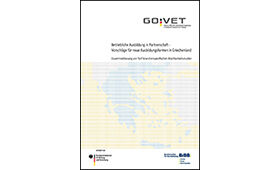German-Greek feasibility studies presented in Athens
24.07.2014 | GOVET
One of the greatest strengths of the German system of dual vocational education and training lies in its elements of practically oriented company-based learning. For this reason, the improvement of company training structures is being accorded a particular level of significance in VET cooperation between Germany and Greece. Five current studies have been dedicated to looking at opportunities to introduce company-based training structures in Greece and offer specific possible solutions for the implementation of this approach. The results of the studies were presented in Athens on 7 July 2014.

Between December 2013 and April 2014, five feasibility studies were conducted on the introduction of company-based training structures in Greece. Each study was a joint project undertaken by a German and Greek partner. The results were presented at the Greek Ministry of Education on 7 July 2014 as part of an event staged by the German Office for International Cooperation in Vocational Education and Training (GOVET) and attended by representatives of the German and Greek Ministries of Education as well as by delegates from companies, trade and industry associations, educational authorities and trade unions.
The studies were funded by GOVET and carried out within the scope of the German-Greek VET cooperation agreement between the Federal Ministry of Education and Research and the Greek Ministry of Education, Religious Affairs, Culture and Sport (Y.PAI.TH). They were professionally supported by GOVET and the Federal Institute for Vocational Education and Training (BIBB). The five project partner teams began by surveying the current status within the selected branches. They then went on to identify the conditions and areas of potential for the establishment of vocational training based in both companies and schools. Alongside the companies from the branches forming the object of investigation, all relevant stakeholders in the respective region were incorporated into the survey including the social partners, the vocational schools, the Vocational Schools Inspectorate, local government authorities and labour administration bodies.
The studies produced proposals regarding the practicability of company-based training models, which may make vocational education and training an attractive alternative to higher education study for young people in Greece. In addition to this, networks comprising numerous partners have emerged which are now seeking to become involved in pilot projects relating to company-based training. Over 100 companies and institutions have already indicated in writing that they are prepared to implement the recommendations.
The analyses of branches and potential areas for training places show that there are definitely good prospects for growth in the fields of tourism, transport and logistics, renewable energies, energy-efficient construction and renovation and manufacturing industry. Existing areas of growth potential are also bringing a requirement for trained skilled workers in their wake.
Improving vocational orientation for young people in Greece is viewed as a major challenge. This is closely associated with the necessity to convey the benefits of company-based training in order to overcome the reservations and resistance displayed by various societal groups. In order to create sufficient company training places, companies need to be convinced of the cost-effectiveness of such training and to be provided with incentives to encourage them to take part. There is also a demand for a higher degree of labour market orientation in terms of training content. One important success factor for the implementation of company-based training models will be training for company training staff. In addition, cooperation between the learning venues of the company and the vocational school will need to be organised and staff involved given appropriate training. The feasibility studies provide five possible solutions to counter these challenges.
As well as the challenges, mention is also made of the numerous opportunities that new vocational education and training (VET) models bring. These include better labour market chances for young people, a reduction in youth unemployment and economic growth. In addition to this, new partnerships can be created between state and non-state stakeholders to implement the training of young people as a joint task and thus make use of the expertise of all of those involved. Finally, the bilateral nature of the pilot projects proposed offer an opportunity to strengthen networking between Germany and Greece and to implement the idea of European solidarity and cooperation in a practical way.
Each of the five feasibility studies contains a concept for the realisation of company-based training in Greece on a pilot basis. These concepts were presented to the German-Greek Working Group on 8 July. The Working Group is composed of representatives of the Ministries of Education and social partners from both countries. The participants in the Working Group welcomed the results of the feasibility studies and are planning the road ahead. The next stages in implementing the concepts involve more detailed specification of the project proposals that have emerged from the feasibility studies and the agreement of a sustainable financing model. The plan then is to implement selected proposals within the scope of pilot training projects.